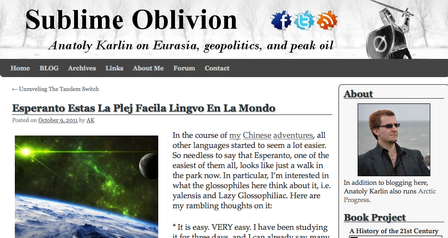
Anatoly Karlin writes a great little piece on his early experience with Esperanto.
He's obviously done his homework because he gets quite a bit of the big picture too.
His story starts:
" In the course of myChinese adventures, all other languages started to seem a lot easier. So needless to say that Esperanto, one of the easiest of them all, looks like just a walk in the park now. In particular, I’m interested in what the glossophiles here think about it, i.e. yalensis and Lazy Glossophiliac. Here are my rambling thoughts on it:
* It is easy. VERY easy. I have been studying it for three days, and I can already say many phrases: e.g. the one in the title (“Esperanto is the easiest language in the world”). Its vocabulary is about 60% Latinic, 30% Anglic-Germanic and 10% Slavic; its grammar is simplified Latinic; its morphology and semantics are largely Slavonic. Being a natural language, everything is very logical, it is entirely phonetic and there are no exceptions. Root words can be easily transformed from verbs (add in “i) to adjectives (add an “e), an adjective (add an “a), a place where it is done (add “ej”), a professional who does it (add “ist”), a female version (add “ino”), a diminished version (add “et”), a magnified version (add “eg”), etc. For people with some familiarity with European languages, the vocabulary is a piece of cake. It will be a lot tougher for Asians, but nonetheless even for them it will still be an order of magnitude easier than starting from a natural language.
* Despite its easiness, I’m discovering Esperanto is very flexible. In a sense, even more so than languages like English or Chinese, which are largely bound by the Subject-Verb-Object structure. Though I may change my mind as I get more advanced, so far it seems to me to be as flexible as Russian, which is amazing considering its grammar is orders of magnitude simpler. Quite frankly, of the languages I’ve looked at it in any detail, it is my favorite by far (the full rankings: Esperanto; Spanish; Russian; Latin; Chinese; English; French; German).
* Why learn it? First, there are studies showing that students who spent a year learning Esperanto were able to assimilate French and other languages quicker thereafter, eventually overtaking the control groups that didn’t study Esperanto. Only about one year max is needed for Esperanto fluency. But there are accounts of some people accomplishing it in days. There are monthly meetings of Esperantists in the Bay Area. I’m planning to attend the next one, and I already feel I won’t be embarrassed to open my mouth. By then I will probably be far better at it than at Chinese, which I’m studying for the fourth month now; a depressing thought, that.
This brings us to the second reason why Esperanto is awesome .........(You can read the rest here.)
He's obviously done his homework because he gets quite a bit of the big picture too.
His story starts:
" In the course of myChinese adventures, all other languages started to seem a lot easier. So needless to say that Esperanto, one of the easiest of them all, looks like just a walk in the park now. In particular, I’m interested in what the glossophiles here think about it, i.e. yalensis and Lazy Glossophiliac. Here are my rambling thoughts on it:
* It is easy. VERY easy. I have been studying it for three days, and I can already say many phrases: e.g. the one in the title (“Esperanto is the easiest language in the world”). Its vocabulary is about 60% Latinic, 30% Anglic-Germanic and 10% Slavic; its grammar is simplified Latinic; its morphology and semantics are largely Slavonic. Being a natural language, everything is very logical, it is entirely phonetic and there are no exceptions. Root words can be easily transformed from verbs (add in “i) to adjectives (add an “e), an adjective (add an “a), a place where it is done (add “ej”), a professional who does it (add “ist”), a female version (add “ino”), a diminished version (add “et”), a magnified version (add “eg”), etc. For people with some familiarity with European languages, the vocabulary is a piece of cake. It will be a lot tougher for Asians, but nonetheless even for them it will still be an order of magnitude easier than starting from a natural language.
* Despite its easiness, I’m discovering Esperanto is very flexible. In a sense, even more so than languages like English or Chinese, which are largely bound by the Subject-Verb-Object structure. Though I may change my mind as I get more advanced, so far it seems to me to be as flexible as Russian, which is amazing considering its grammar is orders of magnitude simpler. Quite frankly, of the languages I’ve looked at it in any detail, it is my favorite by far (the full rankings: Esperanto; Spanish; Russian; Latin; Chinese; English; French; German).
* Why learn it? First, there are studies showing that students who spent a year learning Esperanto were able to assimilate French and other languages quicker thereafter, eventually overtaking the control groups that didn’t study Esperanto. Only about one year max is needed for Esperanto fluency. But there are accounts of some people accomplishing it in days. There are monthly meetings of Esperantists in the Bay Area. I’m planning to attend the next one, and I already feel I won’t be embarrassed to open my mouth. By then I will probably be far better at it than at Chinese, which I’m studying for the fourth month now; a depressing thought, that.
This brings us to the second reason why Esperanto is awesome .........(You can read the rest here.)
 RSS Feed
RSS Feed